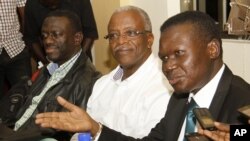Uganda’s Electoral Commission has revised its timetable for political parties to nominate their presidential candidates ahead of the 2016 presidential, legislative and local elections.
The electoral body said recently that the nomination process would be held November 3-4 at the Mandela National Stadium in the capital, Kampala.
The commission also said only four presidential aspirants out of the 49 who filled out nomination forms had met all the commission’s requirements.
Nominations for district chairpersons and councilors are scheduled for November 16-20, while nomination for parliamentary aspirants is planned for December 2-3, according to the electoral commission.
Jotham Taremwa, spokesman for the commission, said official campaigns for presidential elections would begin November 9 and end in February.
“We tried to emphasize the need for the aspirants to follow the guidelines issued to them and ensure that they don’t charge up the environment," Taremwa said. "The environment remains calm, remains peaceful as we prepare to nominate and then flag them off for official campaigning.”
“We work closely with the political parties through the national consultative forum," he said. "We have periodical meetings with party leaders in that forum, and whichever issues that may bring in misunderstandings, they try to be ironed out during that forum. Where there is need, we invite and interact with them and discuss and understand one another.”
Ugandans have expressed concern about next year’s vote following what they say has been frequent use of force by the security agencies to prevent opposition leaders from addressing rallies or meeting their supporters.
They also contend that if not checked, the violence could undermine the credibility of the outcome of the presidential election, which they said could plunge the country into chaos.
Taremwa said the electoral commission planned to work with political parties, security services and international development partners to ensure a peaceful general election.
“We are going to have periodical meetings in which any issues that are raised, we are able to openly discuss them and agree on the way forward,” he said.
“[The election] is not going to be violent, because security is on alert to secure the electoral environment," he said. "So we are not bothered. There could be cases of isolated [violence], but not necessarily to affect the election environment and the electoral process.”
Uganda has had a turbulent political history and has seldom had a peaceful transfer of power.




